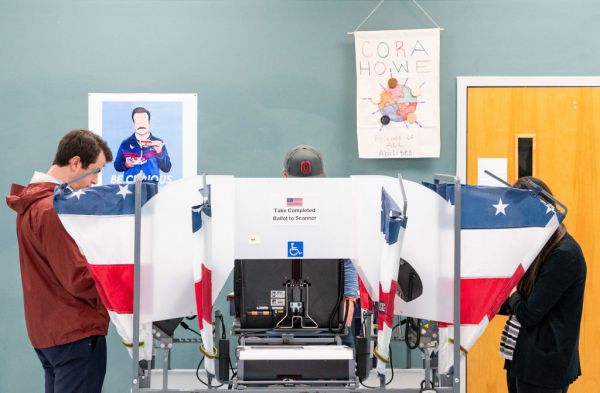In what passes for a Congress these days, one of the top priorities is to cook up legislation that would put your opponents in the worst possible predicament.
For instance, Senate Majority Leader Chuck Schumer is getting ready to force Republicans to once again vote on a package that would increase security at the U.S.-Mexico border. All but four of the 48 Republicans in the Senate voted against it in February on the grounds that it wasn’t tough enough and at the urging of their party’s presumptive presidential nominee who said it would be too helpful to the incumbent.
But five Democrats voted against the measure, too. Schumer voted no so he could preserve the chance under Senate rules to try the stunt he’s pulling this week. But so did three hardcore progressives—Elizabeth Warren and Ed Markey of Massachusetts and Alex Padilla of California—who said the bill was too tough. Joining them was Bob Menendez of New Jersey, but who knows why with that guy.
The majority leader made clear in his announcement for this week that those Democratic “nays” would face no pressure to flip. Indeed, for their perceived self-interest, it will give them a chance to double down on their position. For the other 45 Democrats who did vote for it the first time, the same is true, particularly vulnerable incumbents like Jon Tester of Montana and Sherrod Brown of Ohio.
As the Biden administration dithers on when and how to announce long-telegraphed executive action on the border, this is a way to try to re-inculpate Republicans on the issue that is currently tanking the blue team’s chances in the Senate and the Electoral College.
It’s a hacky gambit, but pretty typical of the kind of failure-is-success pseudo-legislative activity we expect, especially in an election year.
But House Republicans are not going to leave the arena of hacky gambits to Senate Democrats alone, especially on immigration.
Ahead of his bid to block Rep. Marjorie Taylor Greene’s recent effort to unseat him, House Speaker Mike Johnson went to Mar-a-Lago to make an act of obeisance to former President Donald Trump. The result was a press conference in which Johnson first gave Trump something and then Trump reciprocated with a blanket endorsement of the embattled speaker.
What Johnson gave Trump was a promise to crack down on illegal immigrants voting in the 2024 election. The problem, though, is that it’s already illegal for non-citizens to vote in federal elections. Johnson offered a law that would require identification to prove voters’ citizenship, but that’s probably a non-starter since it’s very clear that states set their own rules for the conduct of elections.
But the issue is a hot one for Republicans. On the one hand, one of the tenets of MAGA is that President Joe Biden and his party are intentionally flooding the nation with migrants to get new voters. Some, like Johnson, acknowledge that this isn’t really an issue for November, since none of those coming now would be eligible to vote. Others, either less scrupulous or more ignorant, suggest it’s a bid to steal the election.
There’s not much juice in the issue of non-citizen voting outside of the GOP base, but the issue of immigration generally is absolutely killing Biden and the Democrats. It’s pushing persuadable voters away and softening support among working-class Democratic constituencies most likely to be affected by the costs and chaos of the problem. Combined with stubbornly high inflation, immigration woes are kryptonite for the party in power.
That means that anything that puts Democrats on the side of being lax or permissive when it comes to illegal immigration is bad for their chances. That gives Johnson and the GOP extra motivation to push on the voting issue. It helps with the red team base and could cause heartache for Democrats.
In 2022, the Washington, D.C., city council joined a handful of municipalities around the country that allow non-citizens to vote in local elections. Washington and 15 other cities—all in California, Maryland, or Vermont—allow the practice, but only D.C. falls under federal oversight.
So, House Republicans are going to take the opportunity to squeeze Democrats, as they have on the district’s other progressive initiatives, especially on crime and punishment. Johnson’s team is going to bring forward a bill that would stop non-citizen voting in D.C., and so far Democrats seem likely to oblige them by voting against the measure.
Now, why in this awful election year, would Democrats want to go to bat for non-citizen voting? That’s because their own base tends to be very touchy about the autonomy of the federal district. In her message urging Democrats to oppose the bill, House Minority Leader Katherine Clark denounced Republicans for “attempting to undermine the political self-determination” of D.C.’s residents.
If Democrats vote for keeping the local rule in place, they’re voting for non-citizens voting. If they vote to repeal it, they’re voting with Republicans to stifle the autonomy of a locality progressives say has been run like a “plantation.” For a lot of House Democrats, the “no” vote on the GOP bill will be easy, since in many well-gerrymandered districts, standing up for progressive D.C. and even the political rights of non-citizens will be a winner. But in the two or three dozen competitive districts where Democrats have to think about both base and persuadable voters, this one is a real headache.
Most frustrating for them is that, like Schumer’s resuscitation of the bipartisan border bill, the matter is a moot point legislatively. Just as House Republicans would never let the Senate plan pass even if it magically got the 60 votes it needs in that chamber, the GOP’s bill targeting D.C. will never see the light of day on the Senate side.
Well, at least they’re keeping themselves busy.







Please note that we at The Dispatch hold ourselves, our work, and our commenters to a higher standard than other places on the internet. We welcome comments that foster genuine debate or discussion—including comments critical of us or our work—but responses that include ad hominem attacks on fellow Dispatch members or are intended to stoke fear and anger may be moderated.
With your membership, you only have the ability to comment on The Morning Dispatch articles. Consider upgrading to join the conversation everywhere.